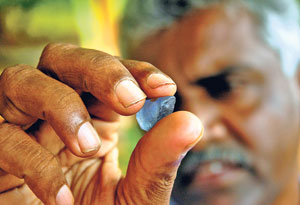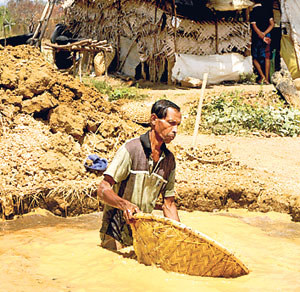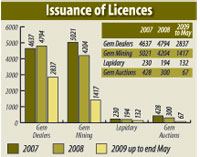The country’s once flourishing gem industry is on the verge of total collapse, with more and more miners pulling out of the business. They cite several reasons for their disillusionment in the industry, but their biggest problems are endless bureaucratic red tape and the global economic meltdown. The result is the loss of billions of rupees in foreign exchange earnings for the country.
The traditional gem mining areas in the Matale district, including Dewaladeniya, Laggala, Kaluganga, Bakamuna and Dasgiriya, are today virtual ghost towns. Some 90 percent of the mining work has come to a standstill, and a large number of mining personnel have left in search of other work in other parts of the country.
 |
| The demand for Sri Lankan gems has dropped because of the worldwide recession. According to one miner, uncut stones that not long ago fetched Rs. 1 million do not sell for even Rs. 100,000 these days. |
Mines are shutting down at an alarming rate, while investors are reluctant to stay with the industry because of stifling restrictions, not to mention the global financial crisis that has kept traditional foreign buyers out of the gem auctions.
But more than the global crisis, miners are blaming the authorities for unnecessary delays, increased taxes, unreasonable regulations and corrupt officials who demand regular “hand-outs”.
Investors say it is almost impossible to cope with the demands of the system. Repeated representations to the authorities to rectify anomalies fall on deaf ears, they say. Meanwhile, some 5,000 gem mining families have lost their livelihood. They have been forced to migrate to other parts of the country in search of alternative employment.
K. M. K. Kohonnara is one of the few remaining miners in Dewaladeniya. He predicts hard times ahead. He says it is a struggle to maintain his mining crew because of the sharp decline in sales and the depressed prices. “Uncut stones that not long ago fetched Rs. 1 million don’t sell for even Rs. 100,000 these days.”
Overheads are high. These include operational costs, licence fees, taxes and other expenses, such as documentation.
“The authorities fail to see all this,” Mr. Kohonnara said. “Instead, they keep making life more miserable for us by introducing rules and regulations every few months.”“This was once a booming gem-mining town. We had more than 100 miners. Today I am the only one left. I can stay on because I had some extra reserves in the bank that I had saved during the good times.”
B. L. H. Ratnayake, a fellow miner from Ratnapura, said the government should come up fast with an action plan to help the crippled industry.
 |
 |
| E. M. Kamal, miner |
E. M. Karunaratne, gem trader,Matale |
| “There are about 2,000 gem mines scattered across Matale district, but today hardly 10 mines are operating.” |
The authorities should be more flexible in their approach towards the miners. Without them, trade will fall to zero |
“I came here because gem mining has practically dried up in the Ratnapura area,” he said. “People there are reluctant to get involved in the industry for the same reasons. But the situation over here is almost as bleak. I will give it one more season. If things don’t improve, I will pack up and move on.
“The biggest burden are the tax increases and the constant pay-offs we have to give officials from a wide cross-section of bureaucrats, including the police. We have to keep everyone happy in order to operate. The rot must end somewhere, before it is too late,” Mr. Ratnayake said.
E. M. Karunaratne, a gem trader from Matale, is frustrated and angry about conditions in the industry. “The authorities should be more flexible in their approach towards the miners. Without them, trade will fall to zero.
“World recession or not, there are still buyers who are interested in our local stones, although they are not giving us top prices. Offers are still coming in, and this is encouraging. But the problem is that there are few people around to harvest the stones from the earth,” Mr. Karunaratne explained.
It is clear the authorities will have to move in fast if they wish to save the mining industry. For a start, they will have to take a softer approach towards the miners. Increasing taxes and imposing other financial burdens will only make a bad situation much worse.
“These mining areas are in the dry zone, where farming is limited. That’s why most of the local people are involved in gem mining. But they have all dispersed – gone to other parts of the country to eke out a living. The mining industry is in the doldrums.”
Another miner, E. M. Kamal, said, “Not long ago there would be 150 to 200 gem traders like myself standing at this same junction. Today there are only six of us left. That’s how bad the situation is at present.”
He said the authorities were to blame, with their bureaucratic delays, bungling and meaningless regulations.
It is not only the miners and gem dealers who are affected by the ailing gem industry.
“This also affects other businesses that depend on the mining industry, such as hotels, eating houses, the markets, and so on. The whole area is like a ghost town. I can’t see things improving in the near future,” Mr. Kamal said.
“There are about 2,000 gem mines scattered across Matale district, but today hardly 10 mines are operating. Those in operation belong to wealthy people who have the financial strength to take risks,” Mr. Kamal explained.
Ajith Perera, deputy director general of the Gem and Jewellery Authority, told The Sunday Times that the authorities were aware of the problems faced by the miners, and said plans were under way to amend some of the rules and regulations.
He said regional offices in the country’s six gem mining areas will be empowered to issue mining licenses. At present, licenses are issued by the chairman of the Gem and Jewelery Authority, and this may be one of the reasons for delays and difficulties, Mr. Perera said.
However, certain strict guidelines and regulations were necessary to stamp out illicit mining and other irregularities that are known to be taking place in remote areas, even in places such as Bakamuna.
“If we become too soft, it will be something like the freedom of the wild ass. In any trade, the government or other authority must impose certain restrictions. Every industry needs guidelines, and the gem mining industry is no different,” Mr. Perera said.
 |
| The number of miners in Matale is dropping as workers go in search of other types of employment in other parts of the country. |
 |
“In recent years there has been a sharp decline in the number of applications for licenses, suggesting that large numbers are leaving the industry. “In the first five months of this year, we issued only 1,417 licenses. Last year we issued 4,204 licences.”
He said most of the applications for licenses come in at the beginning of the year. “In the first five months of this year exports dropped by 31 percent, resulting in foreign exchange losses running to billions of rupees.”
Traditional buyers such the US, Hong Kong, Japan, Thailand are staying out of the market because of the recession.
For the whole of last year the country earned Rs. 21.1 billion in foreign exchange through gem and jewellery exports. In the first five months of 2009, total earnings stood at Rs. 14.5.1 billion, Mr. Perera said.
He said steps were being taken to attract new markets, and there were encouraging signs from countries such as India, China and Russia.
Sri Lanka Gem and Jewellery Association secretary Ziqufi Ismail advised miners with problems to make representations to the authorities in an organised manner.
“Their frustration is understandable,” he said, “but they must handle things in a more professional way.” Mr. Ismail admitted that without the miners the entire industry would be doomed.
(Additional reporting
by Dilrukshi Grero) |






